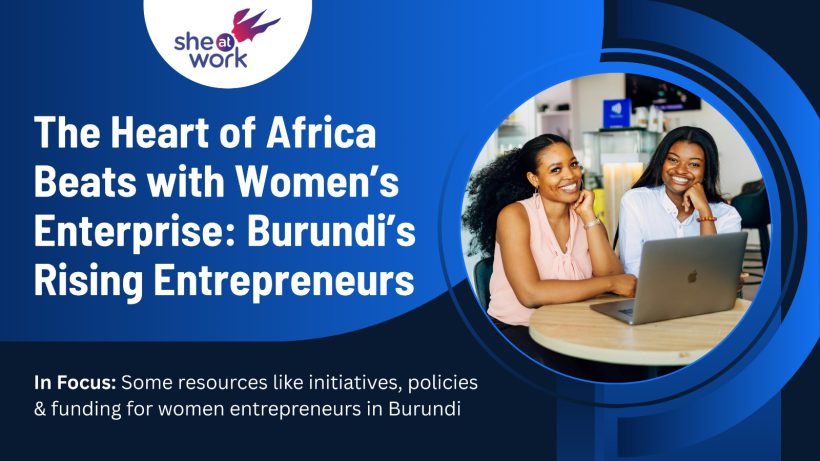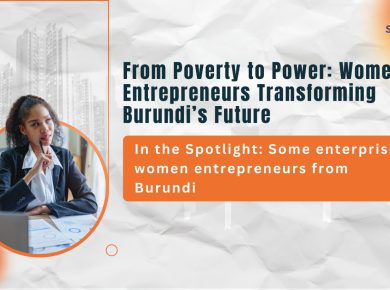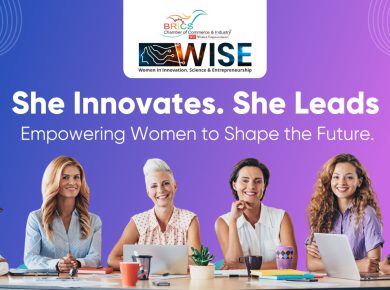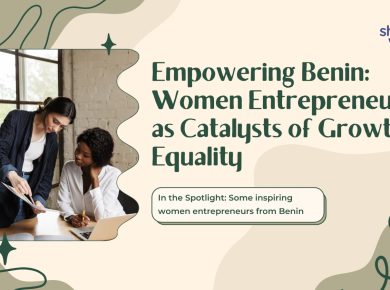In Focus: Some resources like initiatives, policies & funding for women entrepreneurs in Burundi
#WomenEntrepreneurs #BurundiBusiness #HeartOfAfrica #EmpoweredWomen #MicrofinanceForChange #WomenInLeadership #AfricanEntrepreneurs #BreakingBarriers
Burundi is often referred to as “The Heart of Africa” for its central location and heart-shaped outline on the map. It is a nation where women entrepreneurs are steadily carving out their space in the economy despite deep-rooted challenges. In rural areas, women frequently face barriers in accessing land, credit & other essential resources needed to build sustainable livelihoods. Yet, through resilience and collective action, many have strived and found innovative ways to overcome these hurdles.
By forming associations and cooperatives, women in Burundi have been able to pool resources, strengthen their financial security & unlock opportunities for microcredits and savings schemes that would otherwise remain out of reach. These associations not only enable women to address their immediate financial needs but also empower them to create and manage income-generating activities, diversify earnings, and gain greater autonomy in decision-making.
The New Ecosystem of Women Entrepreneurs in Burundi
Recognizing the potential of women entrepreneurs, both government bodies and development organizations have stepped in with targeted initiatives. From policies supporting financial inclusion and capacity building, to microfinance programmes led by the Association of Microfinance Institutions in Burundi (APIM), opportunities for women-led enterprises are expanding. NGOs such as CARE and the International Rescue Committee (IRC) complement these efforts by offering training, mentorship & access to broader markets, while networks like the Burundi Women Entrepreneurs Network foster collaboration and peer support. Moreover, international partners including the United Nations and the African Development Bank continue to provide funding and technical assistance. Together, these resources are transforming Burundi’s entrepreneurial landscape – positioning women as vital drivers of economic growth and social progress.
Let us now showcase the power of some resources like initiatives, policies and funding for women entrepreneurs in Burundi.
- Some Government-led & supported initiatives
· Micro-credit fund: In line with its commitment to gender equality, the government of Burundi created a micro-credit fund to help women start businesses and increase their incomes.
· Youth and Women’s Development Project: Co-financed by the African Development Bank, this project aims to provide vocational training and equip young people and women with technical skills. It focuses on improving agricultural productivity and introducing new agri-food processing technologies, supporting a move toward economic diversification.
· Youth Investment Bank (BIJE): This bank works with partners like UN Women to help young people, including women, develop innovative projects and gain access to financing from banks and microfinance institutions.
· Improving the business climate: The World Bank’s International Development Association (IDA) is financing a project to boost economic growth in Burundi by improving the business climate. This includes strengthening credit infrastructure and introducing new bank guarantee instruments to increase access to credit for micro, small, and medium-sized enterprises (MSMEs), which are predominantly owned by women.
International & NGO partner initiatives
· Women’s Peace and Humanitarian Fund (WPHF): WPHF supports Burundian women’s civil society organizations with funding for initiatives that enhance women’s leadership, participation in building peace and economic empowerment.
· Women Empowered (WE) savings groups: A programme by Global Communities, implemented by partners such as Burundi Friends International (BFI), provides rural women with financial training and support through savings groups. Participants save money and access small loans to start or expand businesses.
· Business Incubator for African Women Entrepreneurs (BIAWE): A project supported by the Common Market for Eastern and Southern Africa (COMESA) and partners, it equips women with business skills, particularly in the textile industry. It also helps them form cooperatives and connects them with market opportunities.
· UNDP and France partnership: In border regions affected by conflict, UNDP and France have partnered with women-led local organizations to promote women’s access to financial services and support their “green businesses”.
· Project to Support Agricultural and Rural Financial Inclusion (PAIFAR-B): The International Fund for Agricultural Development (IFAD) finances this project to improve financial inclusion in rural areas, especially for vulnerable populations, including women and youth.
· Microfinance opportunities: Organizations like Lifeline Energy and CARE International have run initiatives focused on microfinance to help women access savings and financial resources. These programmes work to counter the discriminatory laws and social norms that limit women’s access to economic opportunities.
- The COMESA Federation of Women in Business (COMFWB)
The COMFWB Burundi (AFAB) Agri-business sector laid the groundwork for a dynamic chapter – to establish an agri-business sector committee. Theyoutlined an action plan, which included organizing regular meetings to foster collaboration and support the development of innovative new projects. This would propel the Agri-business sector to forge ahead.
The focus of COMESA programmes was – to encourage women to set up enterprises or expand existing enterprises and improve their economic conditions. Thus, it would also increase the awareness of women in business issues at the policy level.
The Comesa Federation of Women in Business (COMFWB) is a COMESA institution which was established in July 1993 in Zimbabwe with the endorsement of the Authority which is made up of Heads of States and Governments of the COMESA member states.
COMFWB acts as a forum for the exchange of ideas and experience among women entrepreneurs; as an instrument through which the appropriate portion of COMESA Women in Development Programmes are implemented; as a networking forum among women entrepreneurs and as an instrument for encouraging women to set up or expand existing enterprises.
- PCI’s Women Empowered Programme
PCI, a Global Communities Partner had announced the launch of an expansion to the Women Empowered (WE) savings groups project in Burundi. And, the implementing partner Burundi Friends International (BFI) supported the creation of 128 new WE savings groups in Gitega province.
And, BFI expanded the Women Empowered programme in Burundi. They knew that working alongside Project Concern International (PCI) helped them to amplify women’s voices that would otherwise never be heard. Burundian women find great success in saving and starting businesses too.
PCI’s WE programme provides a way for rural Burundian women to overcome roadblocks, reach economic resilience and integrate into the business sector.
BFI began incorporating PCI’s WE program in 2018 by training 12 groups of 15-25 members to save and loan together, practice leadership skills and accomplish personal and community-wide goals in four provinces: Bubanza, Gitega, Kayanza and Ngozi. In 2019, the project added 48 groups in Gitega province.
https://globalcommunities.org/blog/expanding-economic-opportunities-for-women-in-burundi/
- ENTREF
This body is involved with giving support for women entrepreneurs in the agri-business and craft sectors in Burundi. They have an economic empowerment project for Burundian women in key sectors such as – crafts and agri-business.
The project was launched in May 2022 and is implemented by the NGOs AVSI and Kaz‘o’zah Keza in close collaboration with the Ministry of Trade, Transport, Industry and Tourism. The main objective of the project is – to improve the economic empowerment of women through entrepreneurship and a more favorable entrepreneurship ecosystem.
Thus, the project works towards reaching interdependent and mutually reinforcing the following objectives:
i) to improve the capacities and skills of women entrepreneurs in the production, processing, and marketing of their products;
ii) to facilitate their access to finance and to increase their income;
iii) to make the entrepreneurship ecosystem more conducive to the creation and development of women entrepreneurs.
- Burundi Business Incubator (BBIN)
The Burundi Business Incubation (BBIN) is a non-profit organization committed to promoting entrepreneurship & empowering Burundian women-owned SMEs. Under the BIAWE project, BBIN aims to create jobs, provide skills training in cloth production, and foster strategic partnerships for market access.
The objectives are:
– To create jobs for women in Burundi.
– To train women on how to produce high-quality cloth by undergoing skills and entrepreneurial empowerment training.
– To equip women with business skills and technical training to manufacture creative and well-designed textile products with industrial sewing machines.
– To create strategic partnerships with different institutions in the country so as to enable trainees to connect with off-takers and a market for their products
https://www.comfwb.org/programmes/biawe/bbin
- Kahawatu Foundation
Kahawatu Foundation supports women’s associations that are helping rural women in Burundi – to achieve economic empowerment through access to land and credit.
Kahawatu Foundation is a leading NGO dedicated to improving the livelihoods of coffee communities in East Africa. Initiated in 2013, Kahawatu (‘people’s coffee’ in Swahili) focused on helping smallholder coffee farmers – to increase productivity and optimize their income, while working towards economic, social & environmental sustainability.
Today, Kahawatu Foundation is a trusted voice in coffee communities. They have a network of 100,000 coffee farmers in Burundi, Rwanda & Uganda; and they have helped establish 50 women’s associations.
Over time, they have learned that coffee alone isn’t enough. They have gradually expanded their scope beyond coffee agronomy, by also educating coffee communities on the importance of the economic empowerment of women and youth and diversifying sources of income.
They are indeed, building a future where coffee communities are confident and thriving.
They co-design projects and programmes across 3 key pillars. Their mission is – to facilitate the economic empowerment and financial stability of coffee communities by tackling some of the biggest challenges they face today.
Their vision is – to create a world where coffee communities are confident and thriving.
Their purpose is – to empower coffee communities to challenge limiting beliefs.
And their passion is – to bring voices from coffee communities to the world.
https://kahawatu.org/stories_of_change/empowering-women-in-burundi/
- TDB GROUP
TDP Group unlocked funding for women-led small and medium enterprises in Burundi via its SME programme.
As part of its SME Programme, the Trade and Development Fund (TDF) of the TDB Group, actually issued a 3-year BIF 500 million partial risk guarantee facility in favor of the Women’s Initiative for Self-Empowerment S.A. (WISE) in Burundi. WISE will the use the guarantee to borrow BIF 1 billion (≈ USD 510,000) in working capital from Banque de Gestion et de Financement (BGF).
The funding unlocked will be on-lent by WISE in the form of small and medium enterprise loans, particularly in agribusiness and trade.
WISE is one of Burundi’s leading microfinance institutions. It was established in 2007 by the members of the Association of Women in Business in Burundi (AFAB) to
(i) facilitate savings among women,
(ii) provide loans to members and entrepreneurs engaged in micro and small-scale income generating activities,
(iii) provide guarantees that enable members to borrow from local banks, and
(iv) offer non-financial services such as financial education.
WISE’s main objective is – the attainment of economic and financial autonomy of more vulnerable social groups, especially women, to overcome the problem of collateral.
BGF is a Burundian commercial bank that offers a range of financial services mainly through its network of branches and counters across the country’s 9 provinces – in rural and urban areas. The vision of the bank is – to stimulate development by adapting banking practices, which can allow for sustained grown in Burundi.
- Some Policies
Located in Africa’s Great Lakes region, Burundi is a small land-locked country, with scarce natural resources. 90% of its 9 M inhabitants live in rural areas. Women play a major role in Burundi’s national economy and represent 55.2% of the workforce. They are particularly active in the agricultural sector which provides for 90% of food production and 90% of the country’s export.
Burundi’s Constitution provides for a 30% quota of women in the Government, National Assembly and Senate – thus, aiming to promote women’s political participation. The country has made significant progress in the representation of women in electoral decision-making positions since 2010. But, it is unfortunate that despite these improvements, women are still facing numerous challenges.
Burundi has faced poor governance, cyclical and socio-economic crises throughout its history that have exacerbated pre-existing vulnerabilities.
From 2014, UN Women’s interventions in the country focus in building community-level resilience – by reinforcing women’s economic empowerment and strengthening their effective participation in peace, security and humanitarian processes using gender-transformative approaches that challenge gender-based norms and assumptions.
The comparative advantage of UN Women in Burundi has been acknowledged by government, donors and other stakeholders, based on its leadership in supporting the development of the National Action Plan (NAP) on UN Security Council Resolution 1325, building women’s leaders capacities, elaboration and dissemination of the Women’s National Agenda on Peace and Development; and the significant results achieved by community women mediators in social cohesion and conflict prevention.
UN Women is mandated to work with the government and all stakeholders – including CSOs, UN Agencies, Youth Associations, among others to ensure gender equality and women empowerment (GEWE) in Burundi; to implement the UNDAF and achieve identified Sustainable Development Goals, and ensure no one is left behind.
Their programmes are varied and productive.
Women’s economic empowerment is the main focus. Building on regional and country experiences, UN Women in Burundi focuses on improving access to productive resources such as land and loans for women living in rural and sub-urban areas – for creation of a conducive environment (both legislative and institutional) for women’s access to resources, access to market, finance and technology to achieve women empowerment.
UN Women in Burundi has focus on four interlinked interventions: Leadership, Violence against women and girls, Women, Peace and Security (WPS) and Humanitarian Action in conflict-affected areas. Their goal is – to promote gender policy and legislative frameworks in political decision-making for women leaders, particularly at local level; to ensure transformative prevention and access to essential and comprehensiveservices; to promote women’s engagement and effective participation in mediating and resolving conflicts; and to ensure that humanitarian/crisis response planning, frameworks and programming are gender responsive.
https://africa.unwomen.org/en/where-we-are/eastern-and-southern-africa/burundi
- Réseau des Institutions de Microfinance (RIM)
RIM is a non-profit association set up in 2002 by microfinance institutions (MFIs) engaged in the development of financial services – for the benefit of the population evolving outside the traditional banking circuit. RIM has 60 member institutions, covering 99% of the total volume of microfinance activities in Burundi.
In 2012, German Sparkassenstiftung Eastern Africa (DSIK) and RIM signed a partnership agreement with the aim of strengthening the professionalization of the microfinance sector in Burundi. RIM, in partnership with DSIK, has carried out various activities since then.
Here are a few examples:
The introduction of a financial education program in Burundi including a series of training sessions on financial education for primary and secondary school teachers and local authorities, capacity building for the staff of MFIs and their clients, the introduction of shared services referring to services jointly purchased by several MFIs at a lower cost is another activity that was supported by DSIK in collaboration with RIM. In order to enhance professionalization and transparency in the microfinance sector, DSIK and RIM organized the Burundian Microfinance Week, facilitated high level exchange formats with governmental counterparts and supported intensive training programs of MFIs to improve their governance system and reporting to the Central Bank.
The activities jointly implemented by DSIK and RIM over the years have not only substantially impacted the level of professionalism in the Burundian microfinance sector and rendered RIM a service-oriented umbrella organization, but they also institutionalized the annual celebration of the World Savings Day, improved financial literacy and fostered overall financial inclusion of large sections of the Burundian population. The partnership was concluded in September 2024.
University of Burundi (UB)
The UB entered into a partnership agreement with DSIK to implement partnership projects aimed at strengthening Burundian students’ skills in financial literacy, financial management, microfinance, and entrepreneurship through capacity building and institutional strengthening.
https://sparkassenstiftung-easternafrica.org/about-us/partner-eastern-africa










